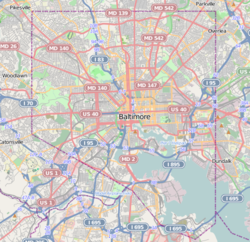| Christ United Church of Christ | |
|---|---|
 | |
| 39°16′20″N76°35′37″W / 39.2723294°N 76.5935772°W | |
| Location | Baltimore |
| Country | United States |
| Denomination | United Church of Christ, formerly German Reformed |
| History | |
| Founded | 1886 |
| Founder(s) | German immigrants |
| Dedicated | June 9, 1888 |
| Architecture | |
| Functional status | Active |
| Heritage designation | For German immigrants |
| Architect(s) | M.F. Decker |
| Architectural type | Church |
| Groundbreaking | 1886 |
| Completed | 1886 |
| Specifications | |
| Materials | Granite |
Christ United Church of Christ, also known as The Little German Church, is a United Church of Christ church located in Baltimore, Maryland. It was formerly a German Reformed church.
